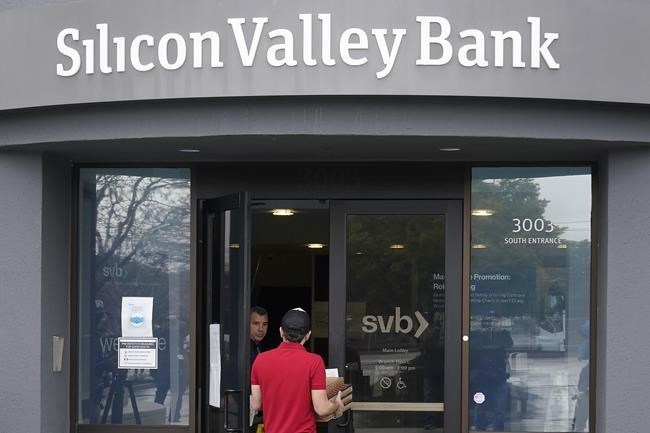As regulators move to address the stunning collapse of Silicon Valley Bank, analysts say there is limited fallout risk for the Canadian financial sector.
"Not only should the failure of [Silicon Valley Bank] not have significant negative implications for our banks, but this crisis should actually be viewed as further vindication of the Canadian banking model," said Scotiabank analyst Meny Grauman in a client note Monday, highlighting the stability of Canada's diversified major banks.
U.S. regulators closed the California-based bank on Friday after a bank run, where fearful depositors concerned about its solvency withdrew billions of dollars all at once. Over the weekend U.S. regulators announced measures to safeguard the financial system, including a guarantee that all deposits at the bank would be honoured. They promised the same for Signature Bank, which regulators forced closed on Sunday.
Canada's banking regulator said late Sunday that it had seized the Canadian assets of Silicon Valley Bank, while emphasizing the limited nature of the crisis and the fact that the bank doesn't hold any commercial or individual deposits in Canada.
"This situation is the result of circumstances particular to Silicon Valley Bank in the United States," said Superintendent of Financial Institutions Peter Routledge in a statement.
The bank had a heavy lending focus on emerging technology and biotech companies, which experienced massive growth during the first two years of the pandemic before the sector pulled back. Tens of thousands of tech workers have been laid off in recent months, from both large and small companies, amid the downturn.
As well, the bank's investment portfolio was overly reliant on long-term fixed-rated bonds, which dropped in value as interest rates climbed. That scenario is not really a concern for Canadian banks, said Grauman.
"The reality is that both the largest U.S. banks and the Canadian and [Latin American] banks we cover have much less significant securities holdings on a relative basis."
Canadian banks are also much less exposed to the technology sector, said National Bank analyst Gabriel Dechaine, pointing out that financial disclosures among banks that break out the sector in their reporting have exposure of between one and three per cent on their loan books.
He said, however, that any broader fallout in Silicon Valley Bank's home market of California could expose the Bank of Montreal to higher risk through its recent Bank of the West acquisition. Royal Bank of Canada also has a presence in the state from its acquisition of City National in 2015.
It's unclear how the crisis will affect TD Bank Group's pending acquisition of U.S. bank First Horizon, but it could allow TD to negotiate better terms, said Dechaine.
The collapse of Silicon Valley Bank, the biggest bank failure in U.S. history after the collapse of Washington Mutual in 2008, has also pushed down stock prices for numerous other financial institutions.
Those include The Charles Schwab Corp. that is down over 30 per cent since last Wednesday, of which TD owns a 12 per cent stake. Dechaine noted that every 10 per cent drop in Schwab's share price translates into a $1.8 billion decline in TD's stake in the company.
Companies in this story: (TSX:BMO; TSX:TD; TSX:RY)
This report by The Canadian Press was first published March 13, 2023.
Ian Bickis, The Canadian Press



